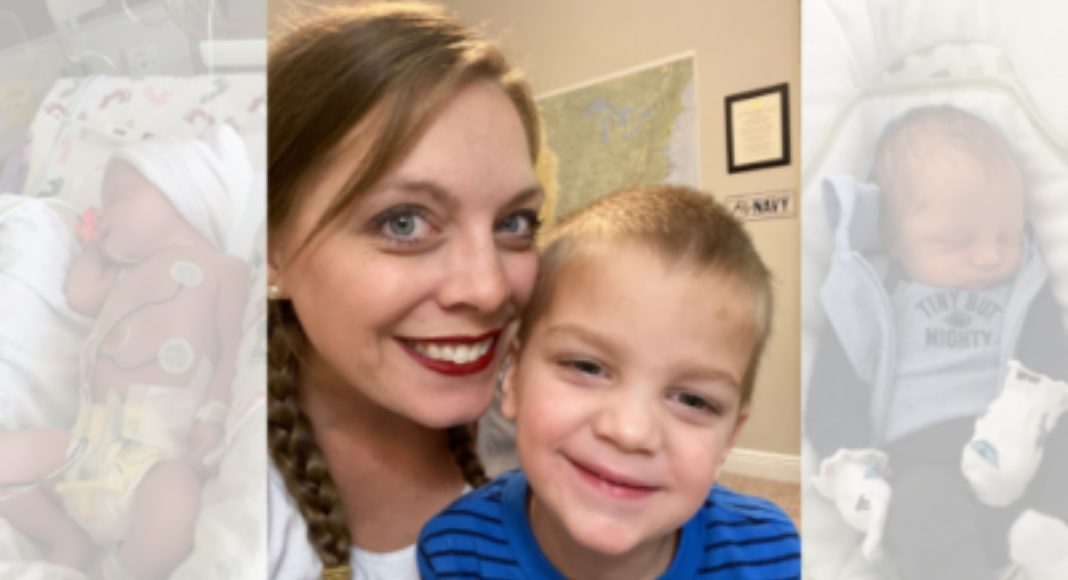This post was written in honor of World Prematurity Day on November 17th and aims to spark conversation and awareness about an often overlooked repercussion of traumatic births.
In an ideal world, those first beautiful moments you gaze into your baby’s eyes creates a life-long bond. But in the real world, this doesn’t always happen. Women who adopt, have postpartum depression, have medical emergencies, and have NICU stays can have minor or long-lasting struggles to bond with their newborn. But this side effect of emotionally traumatic and stressful births is rarely talked about. What new mom wants the guilt of admitting they don’t feel connected to their newborn baby, or worse, don’t even like their newborn baby??
Mama, own your emotions, throw away the guilt, and let’s talk.
The Story of my Premature Baby

My water broke at church when I was 34 weeks pregnant with my second baby. My husband was deployed, and I had no family nearby. I left my toddler in the nursery, half-expecting to pick him up after the second service. I knew something was wrong and drove myself straight to the hospital.
I spent the following 10 days on hospital bedrest, preparing for a NICU stay and just waiting for the moment my doctor said it “was time.” My parents drove into town and picked up my oldest who went home with the church’s nursery director, and my husband was able to come home on medical emergency leave. I had so many friends supporting me and visiting me and praying with me during those days of waiting. I did my best to physically and emotionally prepare for the road ahead, but how could I since we had no idea what to expect once the baby was born?
Even in these days before the birth of my son, I was in an emotionally traumatic and stressful situation that I felt removed from. I tried to be present and connected, but even then, I could feel it. I felt far away and disconnected, unable to process the situation at hand.
Once my son was born at almost 36 weeks, I was already emotionally removed from my circumstances. Even though he was miraculously healthy and we both went home two days later, it was too much for me to process.
I tried to express this and tell people that I wasn’t OK and felt like something was wrong, but I kept being reassured that we were both safe and healthy, and to praise God because it could have been so much worse. But I wasn’t OK. I couldn’t move on. And I subconsciously began to distance myself from my baby as a result of not properly dealing with my emotions.
*Want a more detailed account of his birth story and my emotional struggle at the time? Read the article I wrote about it here.
And then postpartum anxiety hit.

My husband deployed again and left me with a 10 day-old baby and a 19 month-old toddler. I was not OK, but I had to pull it together somehow. I went into survival mode. My baby boy started to have growth issues and eating issues and I felt his pediatrician bullied me out of breastfeeding him. I already felt I was failing my kids by living moment-to-moment in survival mode, but now I really felt that I was failing. How could I not be able to feed my own baby? If he wasn’t breastfeeding, then he didn’t need me.
But if he didn’t need me, what was my purpose?
I felt like the worst mom ever.
*Read more about our breastfeeding struggles here.
I started having vivid worries about the absolute worst case scenario, which usually resulted in death. What if they got a cold and then got complications, and they DIED. What if we got into a car accident on the way to the store, and I DIED.
The anxiety I felt in keeping all three of us alive was debilitating, because I couldn’t control these intrusive thoughts. Nothing felt safe. Leaving the house felt like imminent danger, but I also saw our house as a living death trap, too.
Again, I tried to get help and I tried to talk about it, but I was met with a well-intended, “You’re fine, he’s fine. No one is dying. Relax! You’re a great mom.” It seemed that I was wrong in feeling and thinking these things. It seemed that I was feeling the wrong emotion and it added to my overwhelming failure, because I couldn’t just stop feeling anxious. I couldn’t stop feeling the palpable reality of my perceived failures. And every time I tried to talk to someone about it, they acted like I was crazy and told me to calm down.
This continued for the better part of a year and resulted in textbook avoidance behavior, by subconsciously pushing my baby away. I loved him so dearly, and my mama bear instinct to protect him at any cost was ready to pounce at a moment’s notice. But so was my need to protect myself, and so I withdrew from all of my relationships. But because the bond in my marriage and friendships and with my older son was full-grown before this all happened, I was able to bounce back with them once I finally got the help I needed for my postpartum depression and anxiety.
But my tiny baby still felt like a stranger, and I didn’t know how to fix it. I didn’t even know how to talk about it or who to ask for help.
So many tears.

That sweet little boy could cry for hours, and it would barely phase me. But if my toddler cried for five seconds, I would bend over backwards to fix his boo-boo. I felt so guilty. I could feel the difference, I could see the difference. I tried so hard to spend extra time with my baby boy or force myself to cry when he cried, or feel, really feel, any emotion. But it was forced and then I would cry out of sheer guilt. What kind of mother was I to not “feel love” for my baby?
I loved him, yes. No question. But I didn’t feel it. I chose every day to love him and care for him.
Looking back on it, I think he knew that, too. He had attachment issues and sleep issues, and only mama could bring the comfort he needed. But I didn’t know how to comfort him. I tried endlessly to make him feel the love that I was trying to feel, too, and it showed in the sleepless nights we both had until he was well over a year and a half.
And then I got pregnant again.

When I had my third baby, my oldest was 3 years old, and my sweet little boy was 18 months old. It quickly became even more apparent that something was off between my second-born and I, because just like with my first, I had that instant bond with this little girl. Yes, newborns are hard. Yes, newborns with toddlers are hard. But I felt a deep connection to her that made a stark contrast against my unintentional hardened-heart towards my little boy.
On his second birthday, he woke up in a terrible-two-mood, that literally took him an entire year to break. As the weeks and months went on, I had no trouble standing my ground and not giving into his terrible-two-tantrums. Again, he could cry and scream forever with it barely phasing me. I had to make a conscious effort to calm him and comfort him. To make things worse, he had significant speech delays. We could all tell he was trying desperately to communicate something, anything. But we were at a loss to know what he wanted or how best to respond.
And still, I felt guilty. The voice in the back of my head kept poking at me, taunting me, wondering what kind of mom actually has favorites. What kind of mom doesn’t instinctively care if her baby is crying or laughing? What kind of mom doesn’t know how to comfort her babe? What kind of child am I creating through my behavior towards him??
One day my little boy ran to his room because he didn’t get his way. He cried and cried and screamed and threw himself against the wall and cried some more. I continued cleaning the kitchen, wanting to let him have space to feel his emotions and move on when he was ready (something we try to do with all of our kids). But my wake up call to how apathetic I’d become came when my husband asked that day how long I was going to let him cry. I suddenly burst out, “I will let him cry until I can feel my emotions and I can move on, too!”
It sounded harsh, but it was raw, and it was the truth.
My husband didn’t really understand, and he tried to reassure me that our little boy knew and felt how much I loved him, but I was not convinced. I felt, deep down, that my apathy and lack of connection to him all along played a role in his extreme, self-inflicting, violent tantrums. He only acted this way with me, so how could I not be the root cause?? More guilt…
Building our relationship from scratch

At the end of the year of his terrible-twos (and with weekly speech therapy and occupational therapy appointments) things gradually began to change. My sweet little boy began communicating more effectively and efficiently. I suddenly knew his likes and dislikes. I learned that his favorite color is blue and that he prefers helicopters over airplanes. I knew where he got his boo-boo and how it happened. I learned that his big brother is his best friend, and he thinks his little sister is so cute.
I wish I could say that there was a moment where things instantly changed, but that’s not real life. In the real world, change takes persistence and consistency and time.
And in this case, a layer of my hardened and apathetic heart peeled away with each conversation we had. My core welled with more and more love each time I heard him say, “I love you, Mama.” I still feel so much guilt anytime I think about the past three years and what he and I have gone through.
But I have come to learn that it wasn’t my fault, and that I didn’t really get the help I needed.
What does science say?
The scientific community sums up my experience with one phrase: Postpartum Post-Traumatic Stress Disorder. I no doubt had postpartum depression and postpartum anxiety, but wrapped up in my traumatic birth and evidenced by my instinctual avoidance of my baby, was also PTSD. Most of us in the military community are familiar with PTSD, and Postpartum PTSD looks very similar.
PTSD can affect anyone who experiences a traumatic event. In postpartum women, PTSD may be triggered by a previous history of trauma, events leading up to birth, a difficult labor, unnecessary medical interventions and an unsupportive birth environment, among other factors. But even women with a perfectly typical, happy and healthy labor and delivery may experience birth-related PTSD.
Symptoms include intense anxiety, flashbacks, hyper-vigilance and a fight-or-flight response to emotional triggers. Left untreated, these issues can have severe consequences for a new family.
According to Sarah Szczypinski in Today.com, “It’s a very serious disorder because it can really affect a woman’s ability to bond with her child.”
As written about in Psychology Today, it’s estimated that 1 in 11 women experience experience PTSD postpartum, but symptoms often correlate and are intertwined with postpartum depression and are hard to separate. But the treatment for PTSD is vastly different. Postpartum depression is fueled by the hormonal changes surrounding birth, and postpartum PTSD is a result of trauma (real or perceived) during pregnancy, labor, or birth.
The main treatment for postpartum depression aims at balancing the hormones in the brain, whereas the main treatment for postpartum PTSD involves a habitual re-training of the body’s fight-or-flight response.
I got help for my postpartum depression and anxiety, but didn’t receive the help I needed to recover properly from Postpartum Post-Traumatic Stress Disorder. I wish I had been more open and persistent that I still wasn’t OK. I wish I had been more vocal about not being able to bond with my baby for the first three years of his precious life. Because maybe I would have gotten help and not lost so much time with him.
So, Mama, if any part of my story resonated with you, I beg you to please seek help. Today.
Don’t let anyone tell you, “you’re OK, your baby is OK, calm down,” when you know something isn’t right. Advocate for yourself, and find a mental health provider who specializes in PTSD and perinatal mental health. You are worth it, your baby is worth it, your family is worth it. Throw away the guilt, and don’t stay silent.
Resources tailored just for YOU
- Military One Source offers free counseling (no referral needed!) to military and their dependents in person or over the phone at installations worldwide. Give them a call, live chat, and check out their website here.
- Postpartum Support International has specific military support coordinators you can call anytime or text here, as well as weekly online support meetings (with some only for military!) here.
- To find a knowledgeable provider near you who can help, look here.
Are you (or someone you know) in crisis and need help immediately??
Call the National Suicide Prevention Hotline at 1-800-273-8255, visit their website here or go to your nearest emergency room.












I am sorry you went through this!
I am so glad you wrote this article though. Such a breath of fresh, honest air that I know will resonate with so many moms!
Thank you for being honest!!
Comments are closed.